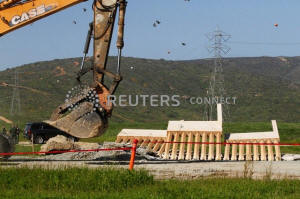|
To
the president's supporters, the eight 30-foot-high (9-meter)
models were a symbol of his commitment to build a wall along the
length of the U.S. Mexico border to enhance national security.
To opponents, they were a waste of taxpayer money and an affront
to Mexico and immigrants.
"Since the test and evaluation of these prototype models is
complete, they have served their purpose and are now being
removed," U.S. Customs and Border Protection (CBP) spokesman
Ralph DeSio said in a statement.
Using jackhammers, ladders and blow torches, military special
forces and CBP special units spent weeks trying to go under,
over and through the walls to test their strengths and
weaknesses.
The tests of the eight prototypes, which Supervisory Border
Patrol Agent Michael Scappechio of the San Diego sector said
cost between $300,000 and $500,000 each to build, showed the
effectiveness of the kind of steel post, or "bollard," fence
that already exists along large sections of the border.
Now, a new 30-foot-high bollard fence is being built as a
secondary barrier along a 14-mile (22.5 km) section, behind an
existing, 18-feet-high bollard fence, Scappechio said.
The ability of agents to see through a barrier is crucial to
their safety, and a fence made out of steel posts or "bollards"
is easier to repair when breached and relatively cost effective,
he said, while the 30-foot height is a deterrent to climbers.
The fence will also incorporate fiber optic sensor, Scappechio
said.
(Reporting by Andrew Hay in New Mexico; editing by Bill Tarrant
and Leslie Adler)
[© 2019 Thomson Reuters. All rights
reserved.] Copyright 2019 Reuters. All rights reserved. This material may not be published,
broadcast, rewritten or redistributed.
Thompson Reuters is solely responsible for this content.

|
|






